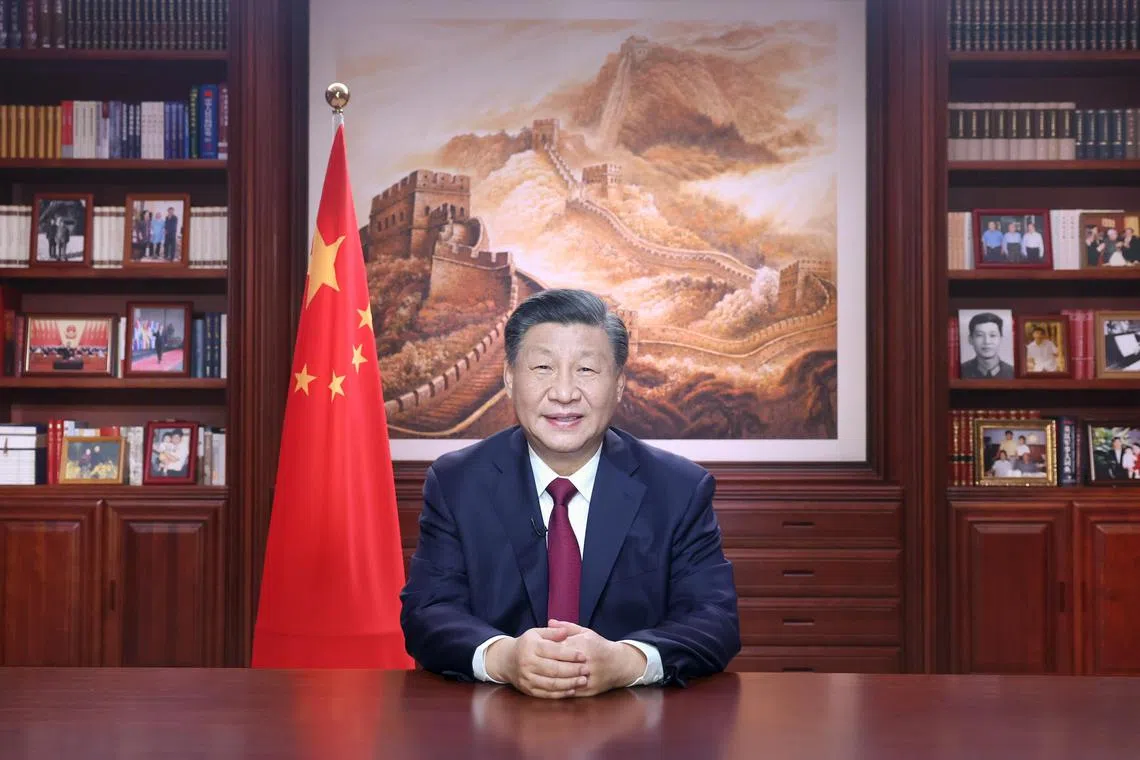China’s Xi bets on economic recovery amid tough challenges in Covid-19 fight
Sign up now: Get ST's newsletters delivered to your inbox

Chinese President Xi Jinping said the country is in a new phase of Covid-19 control and has adapted after following a science-based and targeted approach.
PHOTO: EPA-EFE
BEIJING – President Xi Jinping is betting that an economic rebound this year
In a New Year’s address on Saturday, Mr Xi said the country is in a new phase of Covid-19 control and has adapted after following a science-based and targeted approach. The day before, he said the nation’s strategy had been “optimised” to protect people’s lives and minimise economic costs.
“We have now entered a new phase of Covid-19 response where tough challenges remain,” Mr Xi said.
The government on Dec 7 took definitive easing steps
Mr Xi’s televised broadcast came after data earlier in the day showed economic activity in December contracting the most from the previous month since February 2020. Home sales continued to slump in December, while reports due this week are forecast to show a further squeeze in the manufacturing and services sectors.
While analysts forecast that growth slowed to 3 per cent in 2022, Mr Xi said China’s gross domestic product exceeded 120 trillion yuan (S$23.3 trillion) last year, suggesting that the economy expanded at least 4.4 per cent.
“The Chinese economy enjoys great resilience, tremendous potential and great vitality,” Mr Xi said. “The fundamentals sustaining its long-term growth have remained strong.”
Economists see an increasing possibility of a faster and stronger rebound later in 2023. After the likely slow start in the January-to-March period, growth is projected to pick up to 4.8 per cent for the year, according to the median estimate of economists surveyed by Bloomberg.
“It is actually hard for analysts to provide a reasonable forecast given the virus uncertainties over the past month,” Guotai Junan International’s chief economist Zhou Hao said in a note on Saturday, referring to December’s manufacturing purchasing managers’ index data.
“We reckon investors should look beyond these sentiment figures and pay attention to the high-frequency economic activity data that would provide a gauge of post-pandemic recovery,” he added.
China’s central bank on Friday pledged to support domestic demand and maintain “effective” growth of credit. Monetary policy “will focus on stabilising growth, employment and prices, as well as supporting the expansion of domestic demand”, the People’s Bank of China (PBOC) said.
The PBOC reiterated that it will provide stronger backing to the real economy, keep prices basically stable and step up targeted stimulus for key areas and industries damaged by the pandemic. It also said it will meet the property industry’s reasonable financing needs, and push forward mergers and acquisitions in the sector.
“Given surging infections, the economy is in for a rough time in the next few months before the reopening boost starts to kick in – likely in late February or March after the initial wave has crested,” said Mr David Qu of Bloomberg Economics.
The data reinforces the view that “further policy support will be forthcoming, with the PBOC likely to cut rates” in the first quarter to help stabilise the economy, he said. BLOOMBERG


